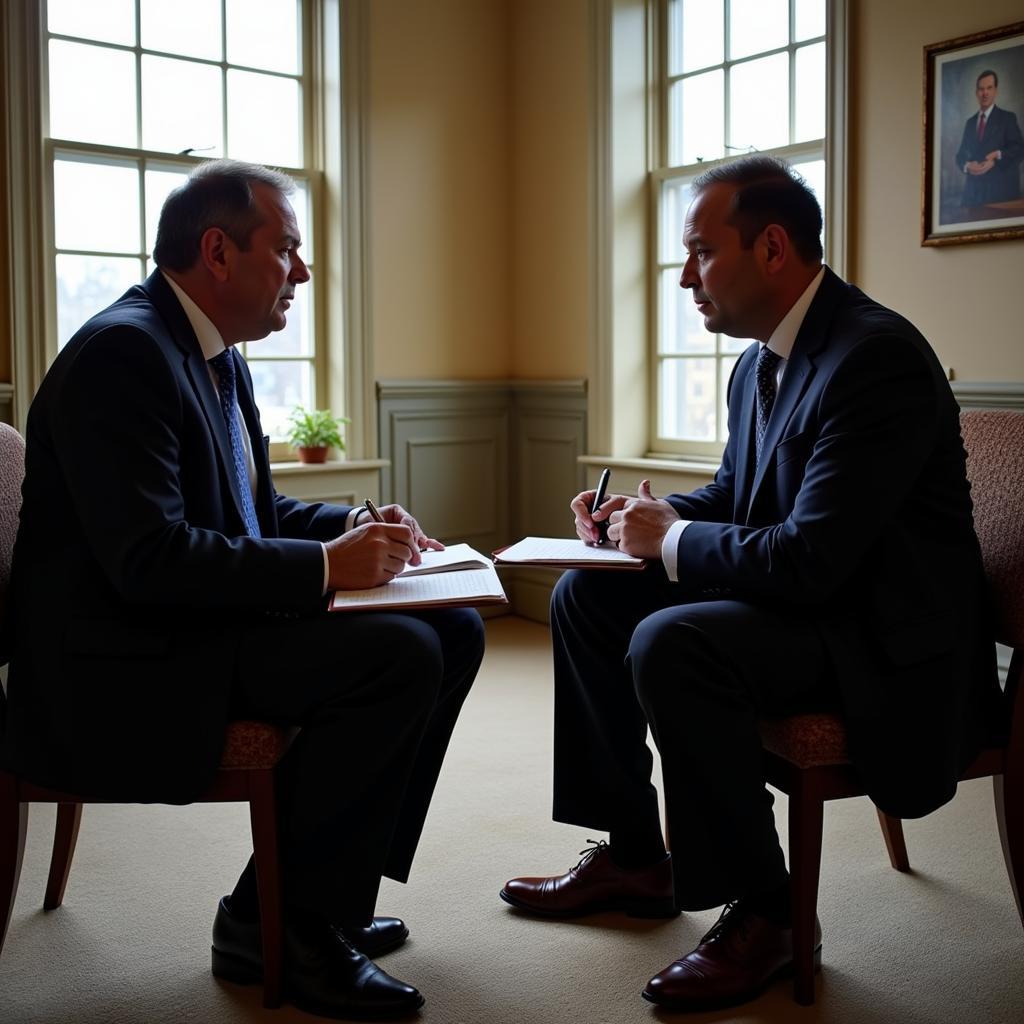Journalistic Research forms the backbone of every credible news story, investigative report, and documentary you’ve ever encountered. It’s the engine that drives the search for truth, the process of meticulously gathering, verifying, and analyzing information to paint an accurate and unbiased picture of events. But what does this rigorous process entail, and how does it empower journalists to separate fact from fiction in our increasingly complex world?
The Power of Verification: Cornerstone of Journalistic Research
At its core, journalistic research is about one thing: verification. It’s about moving beyond the initial claims, the hearsay, and the readily available information to uncover the verifiable truth. This process demands a critical eye, a healthy dose of skepticism, and a relentless pursuit of evidence.
 Journalist Interviewing Source
Journalist Interviewing Source
Journalists employ a multitude of techniques to ensure the accuracy of their reporting. They meticulously scrutinize documents, poring over public records, court filings, and corporate reports. They conduct in-depth interviews with eyewitnesses, experts, and individuals directly affected by the events in question.
Going Beyond the Surface: The Depth of Journalistic Inquiry
Journalistic research isn’t just about confirming or debunking existing claims; it’s about digging deeper, uncovering hidden connections, and providing context. It’s about asking the tough questions others might shy away from and challenging conventional narratives.
 Data Analysis in Investigation
Data Analysis in Investigation
This quest for depth often leads journalists down unexpected paths, requiring them to master new skills and delve into unfamiliar territories. They might need to analyze complex data sets, decipher technical jargon, or even travel to remote locations to piece together the puzzle.
The Evolving Landscape: Adapting to the Digital Age
In today’s digital age, journalistic research has taken on new dimensions. The internet, while a vast repository of information, has also become a breeding ground for misinformation and fake news. This has made it even more crucial for journalists to hone their digital research skills.
They must be adept at verifying online sources, cross-referencing information, and navigating the murky waters of social media to separate genuine content from fabricated narratives.
The Human Element: Building Trust and Cultivating Sources
Despite the increasing reliance on technology, journalistic research remains, at its heart, a human endeavor. It’s about building relationships with sources, gaining their trust, and understanding their motivations.
 Building Trust with Source
Building Trust with Source
It’s about listening attentively, asking the right questions, and respecting the perspectives of those whose stories they are telling. This human connection is what allows journalists to bring empathy and nuance to their reporting, transforming facts and figures into compelling narratives that resonate with audiences.
The Enduring Impact: Holding Power to Account
Journalistic research, in its purest form, is a public service. It’s about holding power to account, giving voice to the voiceless, and shining a light on injustice. It’s about providing the public with the information they need to make informed decisions and engage in meaningful dialogue.
The impact of rigorous journalistic research can be profound. It can expose wrongdoing, spark social change, and even save lives. In a world saturated with information, it serves as a beacon of truth, guiding us through the complexities of our times and empowering us to navigate the world with greater understanding and awareness.
FAQ
Q: What are the key ethical considerations in journalistic research?
A: Ethical journalistic research prioritizes accuracy, fairness, and minimizing harm. It involves obtaining information responsibly, respecting privacy, attributing sources, and avoiding conflicts of interest.
Q: How can I verify the credibility of online sources during my research?
A: Evaluate website credibility (domain name, “About Us” section), check author credentials, cross-reference information, and be wary of biased or inflammatory content. Look for fact-checking websites and reputable news organizations.
Q: What are some common challenges faced in journalistic research, and how can they be overcome?
A: Challenges include accessing information (restricted documents, uncooperative sources), verifying information in the digital age, and facing time constraints. Overcoming these requires persistence, resourcefulness, networking, and utilizing digital tools effectively.
Do You Need Help with Your Own Research?
If you’re facing a perplexing situation or need assistance in uncovering the truth, don’t hesitate to reach out. Our team of dedicated researchers at Paranormal Research is here to help. Contact us at:
Phone: 0904826292
Email: [email protected]
Address: No. 31, Alley 142/7, P. Phú Viên, Bồ Đề, Long Biên, Hà Nội, Việt Nam
We’re available 24/7 to answer your questions and guide you on your journey to unraveling the mysteries that surround you.